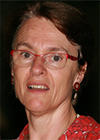Microbiology Editor’s Choice: the fitness costs of rapid plasmid evolution
Posted on January 2, 2020 by Microbiology Society
Each month, a manuscript published in our flagship journal Microbiology is chosen by a member of the Editorial Board. This month, the paper is titled “Extremely fast amelioration of plasmid fitness costs by multiple functionally diverse pathways” and it was chosen by Dr Isabelle Martin-Verstraete.

In this interesting and original work, the authors described the acquisition of rapid chromosomal compensatory mutations to overcome the fitness cost during conjugative plasmid transfer. These acquired mutations are isolated in RNA polymerase, an unknown DNA-binding protein or a two-component system controlling stationary phase phenotypes. Their work highlights the bacterial genome plasticity and its importance in the maintenance and spread of adaptive traits in natural communities.
Extremely fast amelioration of plasmid fitness costs by multiple functionally diverse pathways
Plasmids — genetic elements that transfer genes between bacteria — can encode valuable traits like resistance to antibiotics or toxic heavy metals, but also tend to impose costs because plasmid replication and gene expression is disruptive. Here, we show 'compensatory' evolution overcoming plasmid costs much faster than previously thought. Pseudomonas fluorescens bacteria evolved to compensate the severe costs associated with acquiring the mercury resistance plasmid pQBR55 during the time it took for a colony to grow, by a single mutation in one of three different pathways. By promoting plasmid persistence, rapid compensatory evolution could facilitate spread of ecologically and clinically important traits.
We spoke with corresponding author Dr James Hall to find out more:
What is your institution and how long have you been there?
I'm in the Department of Evolution, Ecology and Behaviour at the University of Liverpool. I started here just over a year ago.
What is your research area?
I'm interested in microbial evolution, particularly the roles of mobile DNA and horizontal gene transfer, and using experiments to understand how microbes evolve.
What inspired you to research this topic?
It wasn't until the end of my PhD (which was on African trypanosome antigenic variation) that I realised that my interests didn't lie exclusively with particular organisms, but in broader principles of evolution and microbial population dynamics. I've since studied evolution in eukaryotic parasites, viruses and bacteria. Microbial evolution is an interesting topic not only for its far-reaching effects on ecosystems and disease, but also as a tractable model for understanding general evolutionary processes. Horizontal gene transfer raises particularly exciting questions about how genes get on with one another, the various conflicts that can arise and be resolved, and the consequences for microbial communities. It's amazing to imagine these processes taking place literally under our noses — in our bodies, our food, and in our environments — it opens a window into the richness, versatility, and ubiquity of life on earth.
Plasmids are intriguing because they seem so simple — just bits of DNA — but because they replicate, they can evolve, and have their own fitness 'interests' that can be distinct from the bacteria that harbour them. I'm interested in understanding how bacteria and plasmids get along. This particular paper arose because I noticed that, initially, plasmid pQBR55 caused bacterial colonies to be very small — something that was easy to overlook because when the colonies were restreaked they were no longer unusual. However, this effect was seen again and again, and during a period when waste was (ahem) 'less efficiently' disposed of, plates left out on the bench for several days clearly showed the emergence of large colony morphologies emerging from the small ones. This led us to design the experiments reported in the paper.
What is the most rewarding part of your research?
I love it when data is coming in. I love talking about science with interested colleagues and collaborators. I love teaching students new techniques and skills, which is something I am doing a lot more of now since starting a new lab group in Liverpool.
What would you be doing if you weren’t a scientist?
Perhaps a teacher, or maybe a potter. But I believe that science is an approach to understanding the world, not (just) a profession — I hope that I'd live by the same approach of observation, consideration, and experiment regardless of my employment!
Follow Dr Hall and his co-authors on Twitter:
@rctwright
@BrockhurstLab
@ellieevolves
@WarlordGuymer
To access the full paper, click here. Editor's Choice articles published in Microbiology are free to read.

